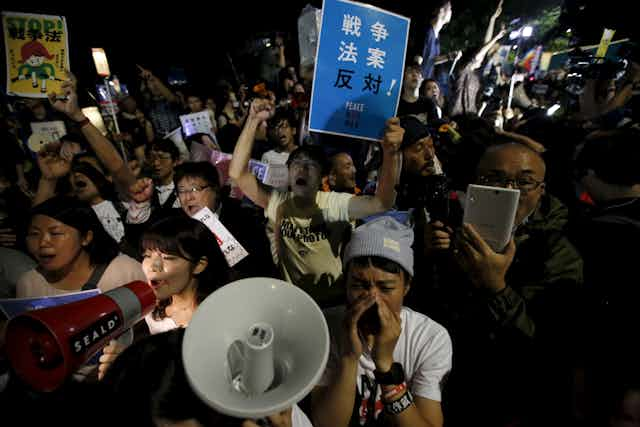As the Japanese government continues to press ahead with controversial changes to its “peaceful constitution”, it continues to fuel domestic protests and fails to get full endorsement from the members of its own ruling party. Prioritising foreign policy while dismissing domestic opposition is hardly a wise course, and Shinzo Abe’s government seems not to have fully anticipated the political risks.
Trouble has been brewing for a while, but rose to a new level in the summer of 2014 when a man self-immolated in Tokyo in June 2014 to protest the reinterpretation of Article 9, which was intended to renounce war permanently.
In the 18 months or so since that astonishing incident, Japan has seen a groundswell of student-led social protests in the name of democracy and peace – but the government has pressed on with its programme of militarising Japan’s foreign policy.
In September 2015 scuffles broke out in Parliament after another law that could let troops fight overseas for the first time since 1945 was pushed through.
That’s a true phenomenon in a country long known for its youth’s political apathy. Protests have been drawing crowds as large as 120,000 people, and have fostered the growth of organised opposition groups.
Rise up
One such organisation is Students Emergency Action for Liberal Democracy (SEALD). It originally emerged in the row over the 2013 state secrecy bill, under which penalties were toughened for journalists and whistle-blowers disclosing sensitive information. When the Article 9 debate began, the group started organising weekly protests at landmarks across Tokyo.
So far these public protests are falling on deaf ears. Not only are the requests being dismissed, but the social movement in itself does not seem to mean much for the LDP government.
Chief cabinet Secretary Yoshihide Suga, PM Abe’s spokesman, condescendingly played down the protests of August 30 2015, the largest seen so far, stating that the turnout was attributable to a mere misunderstanding of the legislation.

This response seems surprising given the memories of the 1960 demonstrations, the largest in post-WWII history, in which millions of people across Japan opposed the revision of the US-Japan security treaty on the grounds that it could lead to further war. Ultimately, the US-Japan alliance was further strengthened and Japan’s voluntary military, the Self-Defense Forces, was also established.
The social movement ended with violent clashes between protesters and police forces, and it’s often cited as one of the factors that led to the resignation of Abe’s grandfather, Prime Minsiter Nobusuke Kishi.
In contrast, the current protests are peaceful, but the effect of the public disapproval is clearly reflected in the dipping public support for the government. After a summer of protests, Abe’s government rate of approval dropped from 51% to 43%, according to a Japan’s national broadcast (NHK) poll.
Wrong track
It’s not hard to see why the government has stirred up such anger, since it has poor form on public relations in this area going back some years. In August 2013 the Japanese deputy PM and Finance Minister, Taro Aso, made the truly outrageous proposition that Japan should learn lessons from the Nazi regime’s surreptitious tactic of changing the constitution in the wake of World War I.
In a speech given at an ultra-conservative meeting, he stated: “Doing it quietly, just as in one day the Weimar constitution changed to the Nazi constitution without anyone realising it, why don’t we learn from that sort of tactic?”
Such statements are not only offensive, but make a mockery of democracy – and two years on, despite mounting protests and a marked decline in the government’s political legitimacy, the gap between the public and the governing party is not narrowing.
Recent polls indicate that 75% of LDP members believe “there is no hurry” for pushing through the constitutional revision, compared with 34% who believe “it should be achieved as soon as possible”. More LDP members are still not convinced that Article 9 should be modified at all; 43% of the respondents said Article 9 should not be changed, while only 37% support a revision.
The Japanese government clearly has put the domestic dimension of its newly militaristic foreign policy to the back of its mind, preferring to concentrate on the military threat from China. That’s been particularly welcomed by the US in particular, but also by Australia and other southeast Asian countries such as the Philippines and Vietnam, who are deeply worried about what they see as China’s brazen territorial expansion.
With this international blessing and a strong base of conservative supporters, Japan’s government will continue to forge ahead with its foreign policy despite major opposition from within its own party and public. But by dismissing domestic criticism while using legal legerdemain to carve out a new security strategy, it’s chipping away at the rule of law and the democratic values on which Japan prides itself.

